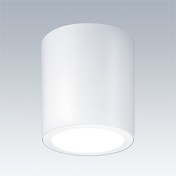Cetus / CETUS3 MSF LCS EHF RWH
96634900
▶Change configuration
- Base: 96634900 — CETUS3 MSF LCS EHF RWH
▼ Data Sheet
Surface mounted LED downlight. Dimmable in steps LED driver. Body: die-cast aluminium. Diffuser: polycarbonate, smooth reflector in white finish with wide beam. Trim: high quality, highly reflective polycarbonate. Class I electrical, IP43. Installation plate to be fitted directly to ceiling, for mounting via BESA box or wire suspension use available accessory. Electrical connection via 3/5 pole, push in, terminal block, Housing mounts to installation plate with twist and lock bayonet mechanism.
Equipped with LCS technology, with two lumen outputs (800lm and 1500lm) and three colour temperatures (3000K, 3500K and 4000K) selectable from below by a rotary switch. Pre-set to 4000K, high luminous flux..
Dimensions: Ø181 x 182 mm
Luminaire input power: 25.3 W
Luminaire luminous flux: 3221 lm
Luminaire efficacy: 127 lm/W
Weight: 2.59 kg
- LED
- GLedReP
- 850°
- Halogenfree
- IK03
- IP43
- LLedReP
- RCM
- RG1
- SC1 - Protection Class 1
- Ta= -20 to +25

